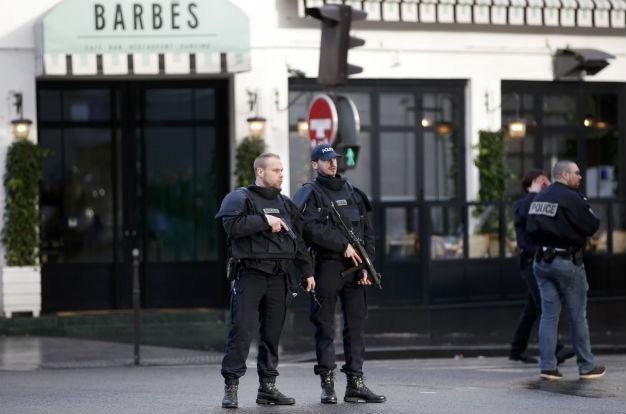Man shot dead attacking police on Charlie Hebdo anniversary
PARIS - Agence France-Presse

REUTERS photo
French police shot dead a knife-wielding man Jan. 7 as he attacked a police station in Paris, a year to the day since jihadist gunmen killed 12 people at Charlie Hebdo newspaper.The man reportedly shouted “Allahu Akbar” (God is Greatest) and was wearing what appeared to be an explosives vest although it was later found to be a fake, police and government sources said.
News of the attack came just after President François Hollande concluded a somber speech at police headquarters to mark the anniversary of the killings at Charlie Hebdo’s offices on Jan. 7, 2015.
“On Thursday morning, a man attempted to attack a policeman at the reception of the police station before being hit by shots from the police,” Interior Ministry spokesman Pierre-Henry Brandet said.
Explosives experts were deployed to the scene in the multi-ethnic Goutte d’Or district, close to the Gare du Nord international station.
The man was found to have been wearing a pouch under his coat with a wire hanging from it, but the device “contained no explosives,” a source close to the investigation told AFP.
With France still grieving after the massacre of 130 people by jihadists in Pari two months ago, Hollande used his speech to call for greater cooperation between the security services.
“Faced with these adversaries, it is essential that every service – police, gendarmerie, intelligence, military – work in perfect harmony, with the greatest transparency, and that they share all the information at their disposal,” the president said.
Many of the jihadists in both January’s rampage and the attacks in November were known to French security services, having either traveled abroad to fight with extremists or been prevented from doing so.
Hollande said that since the attack on Charlie Hebdo, nearly 200 people in France had been placed under travel restrictions to prevent them from joining the Islamic State of Iraq and the Levant (ISIL) in Syria or Iraq.
The president said the three police officers killed in January’s attacks “died so that we could live in freedom.”
A police bodyguard who was guarding the newspaper’s editor, Charb, was killed alongside him by brothers Cherif and Said Kouachi, who also shot dead another policeman, Ahmed Merabet, as he lay injured on the pavement near Charlie Hebdo’s offices.
The next day, a policewoman was killed by jihadist Amedy Coulibaly in the southern suburb of Montrouge, apparently as he was heading to attack a Jewish school.
Among changes set to be introduced in the wake of the November 2015 attacks throughout Paris are new guidelines allowing police to keep their weapons even when off-duty.
The president reiterated his pledge to boost the number of police and armed gendarmes by 5,000.
The speech will be followed by a concert over the weekend to mark the 1 million people who poured on to the streets of Paris on Jan. 11, 2015, in an outpouring of support for freedom of expression in the wake of the deaths of Charlie Hebdo’s best-known cartoonists.
The newspaper had been in the jihadists’ sights since it first published cartoons of the Prophet Muhammad in 2006.
The widow of Franck Brinsolaro, a bodyguard who was killed in the attack, said this week she had filed a lawsuit claiming that he was left vulnerable because the security around the newspaper had been reduced before the shootings.
Charlie Hebdo has continued to raise ire, rejecting self-censorship in the wake of the attacks and working from ultra-secure offices in a top-secret location.
On Jan. 6 it published a typically provocative special edition featuring a gun-toting God, sparking protests from the Vatican.
The cover of the anniversary edition features a bloodstained, bearded God figure in sandals with a Kalashnikov rifle slung over his shoulder under the headline: “One year on: the killer is still at large.”
















